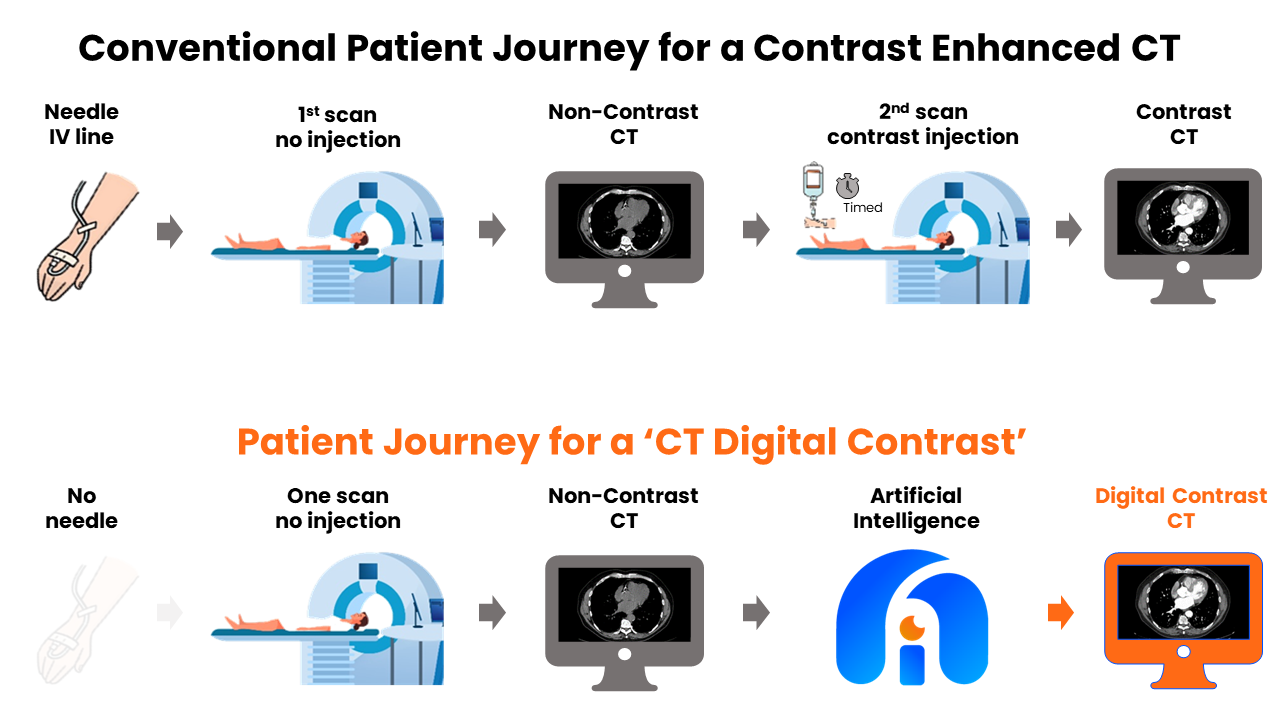NetZeroAICT: Pioneering Sustainable Healthcare through AI
In a world where medical advancements are crucial, the NetZeroAICT project stands at the forefront of innovation and sustainability. Our mission is simple yet profound: to revolutionize medical imaging, making it safer for patients and sustainable for our planet.
The Challenge:
- Every year, millions of CT scans are performed worldwide.
- Many of these scans require radiocontrast media, which:
- Poses potential risks to patient health.
- Contributes to environmental pollution.
- Adds to the substantial carbon footprint.
Our Solution:
- NetZeroAICT is harnessing the power of artificial intelligence to create a future where ‘Digital Contrast’ CT scans are the norm.
- By eliminating the need for traditional contrast agents, we aim to:
- Reduce environmental impact.
- Enhance patient safety.
- Lead the charge towards a NetZero future in healthcare.

Project details
Abstract
Computerised Tomography (CT) scan is one of the most common medical imaging performed in healthcare, Each year, 300 million CT scans are performed globally. Of these, around 180M include the use of radiocontrast media (RCM). Contrast Enhanced CTs (CECT) create a significant environmental impact, namely 42,000 tonnes of single-use packaging, 900 Tonnes of surgical steel (needles), 90,000 tonnes of plastic tubing and 150,000,000 kWh in energy consumption. These generate, on average, 9.2 kg of CO2/ scan. In addition, CECTs generate 200,000 tonnes of iodine contamination in water per year. This is a recognised form of ‘pharmaceutical pollution’. CECTs may also harm patients: needle insertion, toxicity of iodinated RCMs to kidneys (potentially kidney failure) and allergic reactions, which in some cases can be life-threatening. Healthcare systems are responsible for the 4.4% CO2 global emissions (2 Giga tonnes/yr). Of this, ~3 Mega tonnes/yr are generated from CECTs. The EU has declared its NetZero targets of by 2050 through the European Green Deal. We showed feasibility in the fact that artificial intelligence (AI, deep learning methods) can extract high-level information from non-contrast CT scans and synthesise contrast ‘digitally’. This avoids the need to administer RCM for CECTs. We seek to develop and validate 5 use cases of CT ’Digital Contrast’ during this Horizon award. By implementing ‘Digital Contrast’ for scans globally, we aim to reduce 30% of the CO2e and iodine RCM waste generated from CECTs by 2033. NetZeroAICT has a grand vision to define a reference framework for the scalable development of AI health tools for a future of sustainable health systems. This builds on our prior efforts of the AICT consortium, which was established to make CT imaging safer, more efficient, more equitable and more sustainable. NetZeroAICT will accelerate the EU’s trajectory towards NetZero and advance the EU’s globally recognized leadership position on Healthcare sustainability.
Objectives
The ambition of NetZeroAICT is to develop state-of-the-art trustworthy Green AI to synthesise ‘CT Digital Contrast’ and reduce the global reliance on iodinated radiocontrast media (RCM) for computerised tomography (CT) imaging. To achieve the project aims, the following objectives have been set:
- Implement legal, ethical, and sustainable frameworks that promote the trustworthiness of NetZeroAICT.
- Establish a centralised, trusted CT image repository for medical AI development which champions the FAIR principles.
- Classify CT images by their characteristics through a central computation platform.
- Implement a ‘green’, sustainable and integrated computational pipeline for the training, validation and deployment of medical AI.
- Develop and validate 5 clinical applications (Indication For Use (IFU): CT angiogram of aorta, pulmonary artery, neck and brain arteries, limb arteries, coronary arteries) of ‘Digital Contrast’ for CT imaging. Each IFU is validated using 1,000 cases.
- Validation of the trustworthy NetZeroAICT products through engaging stakeholders
- Demonstrate the environmental impact of our innovations through comprehensive social-life cycle analyses. A global reduction of 900,000 tonnes of CO2 emission is expected if conventional contrast imaging is reduced by 30%. Projected savings of €2B in EU and UK per year.
- Define the roadmap to wider exploitation and impact for the NetZeroAICT ecosystem – towards sustainable and climate-neutral health systems.
- Promote awareness of NetZeroAICT innovations to key stakeholders, with additional focus on 5 key economies (Germany, UK, France, Italy, Spain) in Europe.
Impact
NetZeroAICT will revolutionise healthcare by reducing the environmental footprint created by CT scans, which are one of the most commonly performed clinical scans in healthcare systems. CT scans are estimated to result in 3 mega tonnes of CO2 emission globally (9kg/scan), and iodinated RCM required for CT scans further accounts for 3% of pharmaceutical waste released into the wastewater (estimated 200,000 tonnes of iodine/year). We aim to reduce 30% of this environmental footprint by 2033 by deploying the Digital Contrast AI in all European countries.
Ultimately, NetZeroAICT is expected to refine the AI / deep learning pipeline to simulate contrast enhancement in CT images in a pathology-agnostic manner.
Traditional CT Scan (1st Path)
AI-Enhanced CT Scan (2nd Path)
The AI-driven approach not only improves patient comfort but also aligns with environmental sustainability and healthcare cost reduction goals.
The image effectively illustrates the benefits of deploying AI to transform the CT scan process into a safer and more efficient diagnostic tool.